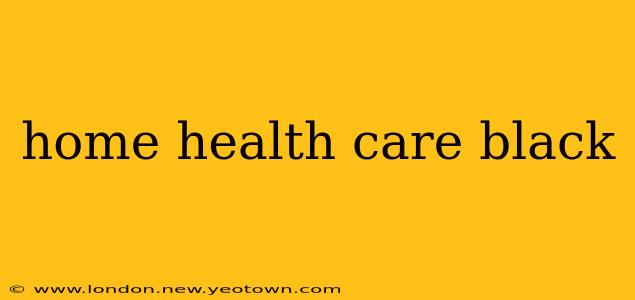The need for quality home healthcare is universal, but access and experience often differ significantly across communities. This piece explores the unique challenges and triumphs within the Black community when it comes to receiving home healthcare services. We'll delve into the disparities, the crucial need for culturally competent care, and the path toward a more equitable future.
What are the biggest challenges faced by Black Americans seeking home healthcare?
The challenges faced by Black Americans seeking home healthcare are multifaceted and deeply rooted in systemic inequalities. Historically, discriminatory practices have limited access to quality healthcare, leading to higher rates of chronic illnesses within the Black community. This, in turn, increases the demand for home healthcare. However, several barriers often prevent individuals from receiving the care they need:
-
Access to Insurance: Limited access to adequate health insurance coverage can make affording home healthcare services nearly impossible. Many Black Americans are disproportionately uninsured or underinsured, creating a significant financial hurdle.
-
Geographic Location: Home healthcare services aren't evenly distributed geographically. Many underserved urban and rural communities with high Black populations lack sufficient providers, leading to longer wait times and limited options.
-
Cultural Competence: A major concern is the lack of culturally competent care. Home health aides and nurses need to understand and be sensitive to the unique cultural beliefs, values, and communication styles of Black patients. Failure to do so can lead to misunderstandings, mistrust, and ultimately, poorer health outcomes.
-
Bias and Discrimination: Sadly, implicit bias within the healthcare system can lead to disparities in the quality and access to home healthcare for Black patients. This can manifest in various ways, from delayed referrals to unequal treatment.
Is home health care more expensive for Black Americans?
While not inherently more expensive in terms of the price list, the effective cost can be higher for Black Americans due to the previously mentioned barriers. The need to travel further to find qualified providers, the potential for navigating bureaucratic hurdles related to insurance, and the added emotional toll of facing potential bias contribute to a higher overall cost. The indirect costs—lost wages due to caregiving responsibilities, for example—also disproportionately affect Black families.
Are there home health agencies specializing in serving Black communities?
The availability of home health agencies specifically specializing in serving Black communities is still limited. However, the growing awareness of healthcare disparities is driving efforts to create more culturally sensitive and accessible services. The search for a provider should prioritize agencies that demonstrate a commitment to cultural competency and a diverse workforce. Asking about staff demographics and experience with similar patient populations is vital.
What are some ways to improve home health care access for Black Americans?
Improving home healthcare access for Black Americans demands a multi-pronged approach. This includes:
-
Addressing Systemic Racism: Tackling the root causes of health disparities requires a concerted effort to dismantle systemic racism within the healthcare system and beyond.
-
Expanding Insurance Coverage: Increasing access to affordable health insurance is paramount in ensuring that individuals can afford the necessary home healthcare services.
-
Investing in Community-Based Programs: Supporting community-based organizations that provide culturally competent home healthcare services can help close the gaps in access.
-
Promoting Diversity in the Healthcare Workforce: Increasing the diversity of home health aides and nurses can improve cultural understanding and provide more relatable care.
-
Data Collection and Monitoring: Regular data collection and monitoring can help identify and address disparities in access and quality of home healthcare services for Black communities.
The journey towards equitable home healthcare for Black Americans requires a collective commitment. By recognizing the challenges, advocating for policy changes, and supporting initiatives focused on culturally competent care, we can work towards a future where everyone has access to the quality home healthcare they deserve. The story of home health care in the Black community is not just about overcoming obstacles; it's about building a healthier and more just future.

